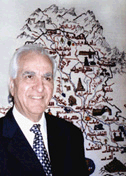Religious Tourism is Peace Tourism
We talked in previous issues about different types of tourism dominant in the world, and were able to conclude that for us the best kind is Religious Tourism. This tourism follows in the footsteps of the prophets and saints, because their life is a guide for believers and their method is a beacon illuminating the way forward. Their mausoleums are mosques where people pray, contemplate the lives of these great personalities, implore God for forgiveness, help and to provide them with peace and security in this world and in the afterlife.
In reviewing the course of these prophets, including the most important with missions on earth, we find that they were messengers of peace, and guides of humanity towards tranquillity. They established the foundations of peace and justice on earth. As Muslims, we believe that their message is an eternal one which God wanted to be a beacon illuminating the way of generations throughout history, so that peace reigns on earth.
These prophets are Noah (Dean of messengers and confidant of God), Abraham (the father of the prophets and the one chosen by God), Mosses (who spoke with God), Jesus (The word of God) and Mohammed (the beloved of God and the last of the prophets and messengers). They struggled to convey the divine message to Earth and were God's commissioners.
Having known that the essence, content and source of the message of each of these five prophets is the same, we realize that we are facing an extraordinary force for peace, as an object, method and reality. They can unify the world on the basis of principles and values of peace based on universal justice.
Their message was the same, despite the different eras in which they were sent, and their diverse method in spreading it. This is not surprising given that their source and legislature is the same God. The content of the message always called for the spreading of peace and mercy on earth, and to distinguish between acts harmful to the person in his life and the afterlife and those that are beneficial in his life and beyond.
Beneficial acts include: faith, unity, justice, charity, trust, abstinence, courage, patience, the call to virtue and warning against vice, the preservation of family ties, exemplary treatment of parents, benevolence towards neighbours, settlement of rights, faithfulness to God in all actions, counting on God and his aide, accepting his fate and judgement, believing in his messengers and their information and what is of benefit to man and society, and to various creatures on earth, in order to ensure their preservation. Environmental sustainability must be achieved for future generations.
God has laid down these laws as a tribute to human beings and to preserve their interests. If left to their own desires the people can transgress taboos and encroach on the rights of others. In his great wisdom God sent Messengers, reminding the people of the divine commandments, warnings against sins, preaching to them and reminding them of their debt to their ancestors. If the new information is repeated, it will awaken minds. The people who are most ready to listen, will have more understanding. Those with more understanding are more active in their practices.
But the path is not always full of flowers. Religions have been repeatedly misused. The message of peace and mercy they conveyed has been used to justify the most heinous human crimes. Surely the vice is not in religion itself; whoever wants to commit a crime has no difficulty in finding a justification. Therefore, caution should be exercised in the interpretation of religion. A distinction should be made between the human interpretation of religions, or doctrines within the same religion, in order to isolate the self indulgent interests of certain groups, which have caused incalculable pain and evil, and the intentions of divine religions, which are a source of mercy, happiness and good for humanity. These are the values which the great prophets called for and made their sacrifices for.
An example of religious tourism
If these are the benefits of prophets, they have rights over believers. It is the duty of the believers to visit the prophets graves and mausoleums, for prayer and invocation. Such visits are, without doubt, one of the main sources of religious tourism.
There are many examples of religious tourism destinations, but we will confine ourselves to one example of the Hajj at The Holy Ka'aba that every Muslim must carry out at least once in his/her life time if they can afford it.
The Hajj
The hajj is an obligation which could be described as the largest, oldest, peaceful tourist march. It is followed by the largest conference in the world involving millions of Muslims with their ethnic, linguistic and cultural differences. It would be no exaggeration to say that the Hajj is the most perfect representation of collective human behaviour, because of the precision and organization that characterize it. Social interaction between individuals during the performance of various rituals has important advantages and benefits. It is, perhaps, the same benefit as was anticipated by the Prophet Ibrahim when he left some of his family members in the arid and inhospitable desert, and implored God to make sure that people would have compassion for them before he requested God to provide them with earthly goods. His imploring is mentioned in the holy Quran:
"O our Lord! I have made some of my offspring to dwell in a valley without cultivation, by Thy Sacred House; in order, O our Lord, that they may establish regular Prayer: so fill the hearts of some among men with love towards them, and feed them with fruits: so that they may give thanks." (Sura Ibrahim/37).
It will need much more space to explain the social and psychological benefits of Hajj in this article. But we will consider some related aspects.
The performance of Hajj to the holy house, scrupulously observing its rituals, is an ideal education in the way in which man must live safely and at peace with his environment. This was stressed by a contemporary writer: "I believe that the season of Hajj is a model of peaceful life to be followed by mankind, irrespective of their differences and increase in population. So, are prohibited, carrying weapons and hunting. Even the stones, in Stoning the Devil, must be small and discarded without excessive force... And in talking, disputes are banned for fear that things get out of hand, leading to discord and infighting. "
On a purely psychological level the Muslim who performs his pilgrimage feels a kind of purification from his sins, and a release from feelings of guilt that often cause psychological illnesses. Moreover, the Muslim who goes on Hajj believes that it will open the door to paradise. That is the ultimate goal for which he works his whole life. Thus, the human being substitutes positive feelings for other negative ones and accordingly finds tranquillity, security and peace.
Religious Tourism and peace
We saw through a single example of religious tourism, the Hajj, the multiple beneficial effects which are visible (material) and non-visible (spiritual). The same can be said during visits to major mosques in the Islamic world and holy places in Iraq (Najaf, Karbala, Kadhimiyah and Samara) and Palestine (Jerusalem and Al-Khalil), for example. We cannot describe all these places, but it is very important we learn the following lessons:
-- Religious tourism is the best kind of tourism, because it can give the individual security, tranquillity and peace, because of its spiritual and worldly returns, and its collective character. Therefore, officials in places of authority are required to devote full attention to this type of tourism, describing it as a tourism of peace. This must be widespread at all levels to consolidate the spread of peace and love between nations.
-- Religious tourism, in its various forms, is the biggest organized group tourism in the world. It is estimated to involve hundreds of millions of tourists and tens of billions of dollars annually. Accordingly, the proper management of this kind of tourism in any country will reflect positively on all economic sectors such as transport and communications and other sectors, while promoting other types of tourism: nature, heritage tourism linked to the country's culture, rural and cultural.
-- The role of apostles and prophets and their teachings was essential for the development and progress of mankind. Even if they appeared at different times and in various regions, their role, mission and purpose was the same: namely to help humanity to develop and progress scientifically and spiritually.
-- The revitalization of the trails of prophets and saints, making sites tourist attractions to educate new generations in the principles of peace and mercy as intended by the divine message, is a decisive step towards the dissemination of the principles of peace and justice in the world, knowing that the majority of the world's population is monotheistic.
-- Tourism is regarded as one of the most important means of rapprochement, interaction, communication and meetings between civilizations. The influential international tourism organizations must ensure and consolidate the general ethical values that tourists and the host country must respect, so that everyone can benefit from the various forms of tourism: religious, health, social or economic.
Let Religious Tourism be the top priority of those who are responsible for tourism in the Islamic world. Thus, they should devote considerable attention to mosques which have mausoleums of prophets and saints, including Ahl al-Bayt (descendants of the Prophet). A visit to these places should be a source of inspiration for lessons on unity, security and peace, and a way of preventing dissension, differences and disputes.
Fellow travellers on the roads of peace continue your march and God bless you
|

